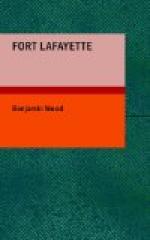“And I, too,” he thought, “have become the craftsman of Death, training my arm and intellect to be cunning in the butchery of my fellows! Wearing the instrument of torture at my side, and using the faculties God gave me to mutilate His image. Yet, from the pulpit and the statesman’s chair, and far back through ages from the pages of history, precept and example have sought to record its justification, under the giant plea of necessity. But is it justified? Has man, in his enlightenment, sufficiently studied to throw aside the hereditary errors that come from the past, clothed in barbarous splendors to mislead thought and dazzle conscience? Oh, for one glimpse of the Eternal Truth! to teach us how far is delegated to mortal man the right to take away the life he cannot give. When shall the sword be held accursed? When shall man cease to meddle with the most awful prerogative of his God? When shall our right hands be cleansed forever from the stain of blood, and homicide be no longer a purpose and a glory upon earth? I shudder when I look up at the beautiful serenity of this autumn sky, and remember that my deed has loosened an immortal soul from its clay, and hurled it, unprepared, into its Maker’s presence. My conscience would rebuke my hand, should it willfully shatter the sculptor’s marble wrought into human shape, or deface the artist’s ideal pictured upon canvas, or destroy aught that is beautiful and costly of man’s ingenuity and labor. And yet these I might replace with emptying a purse into the craftsman’s hand. But will my gold recall the vital spark into those cold forms that, stricken by my steel or bullet, are rotting in their graves? The masterpiece of God I have destroyed. His image have I defaced; the wonderful mechanism that He alone can mold, and molded for His own holy purpose, have I shattered and dismembered; the soul, an essence of His own eternity, have I chased from its alotted earthly home, and I rely for my justification upon—what?—the fact that my victim differed from me in political belief. Must the hand of man be raised against the workmanship of God because an earthly bond has been sundered? Our statesmen teach us so, the ministers of our faith pronounce it just; but, oh God! should it be wrong! When the blood is hot, when the heart throbs with exaltation, when martial music swells, and the war-steed prances, and the bayonets gleam in the bright sunlight—then I think not of the doubt, nor of the long train of horrors, the tears, the bereavements, the agonies, of which this martial magnificence is but the vanguard. But now, in the still calmness of the night, when all around me and above me breathes of the loveliness and holiness of peace, I fear. I question nature, hushed as she is and smiling in repose, and her calm beauty tells me that Peace is sacred; that her Master sanctions no discords among His children. I question my own conscience, and it tells me that the sword wins not the everlasting triumph—that the voice of war finds no echo within the gates of heaven.”




